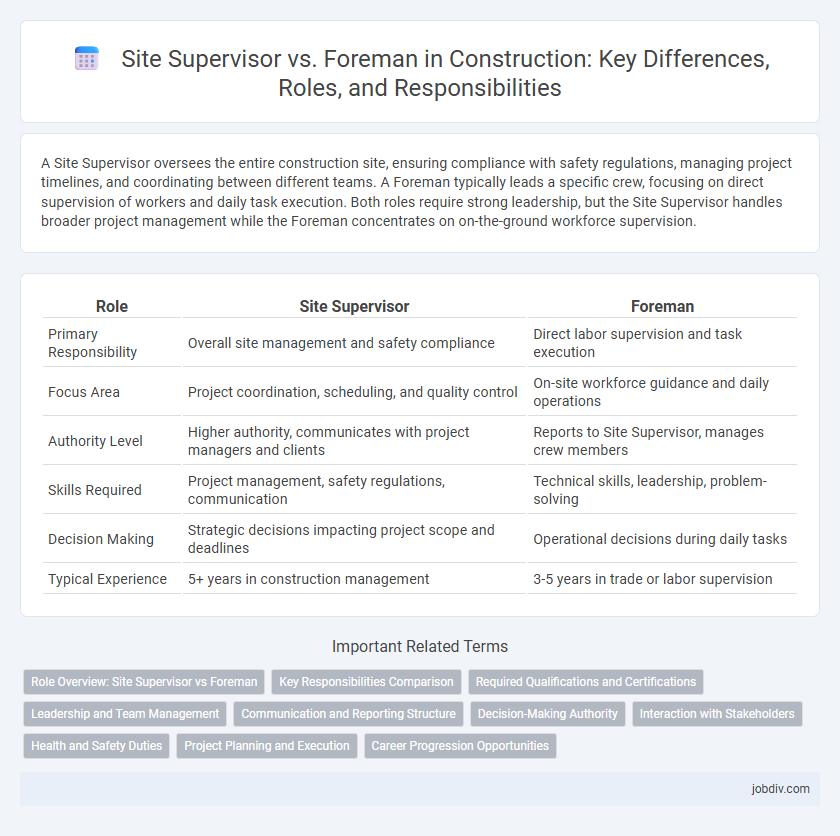A Site Supervisor oversees the entire construction site, ensuring compliance with safety regulations, managing project timelines, and coordinating between different teams. A Foreman typically leads a specific crew, focusing on direct supervision of workers and daily task execution. Both roles require strong leadership, but the Site Supervisor handles broader project management while the Foreman concentrates on on-the-ground workforce supervision.
Table of Comparison
| Role | Site Supervisor | Foreman |
|---|---|---|
| Primary Responsibility | Overall site management and safety compliance | Direct labor supervision and task execution |
| Focus Area | Project coordination, scheduling, and quality control | On-site workforce guidance and daily operations |
| Authority Level | Higher authority, communicates with project managers and clients | Reports to Site Supervisor, manages crew members |
| Skills Required | Project management, safety regulations, communication | Technical skills, leadership, problem-solving |
| Decision Making | Strategic decisions impacting project scope and deadlines | Operational decisions during daily tasks |
| Typical Experience | 5+ years in construction management | 3-5 years in trade or labor supervision |
Role Overview: Site Supervisor vs Foreman
Site Supervisors manage overall project execution, ensuring compliance with safety regulations, coordinating subcontractors, and maintaining schedules. Foremen handle frontline task management, directly supervising laborers, enforcing day-to-day work quality, and reporting progress to Site Supervisors. The Site Supervisor oversees the broader construction process, while the Foreman focuses on operational workforce supervision.
Key Responsibilities Comparison
Site Supervisors oversee overall project execution, ensuring compliance with safety regulations, quality standards, and timeline adherence. Foremen manage day-to-day tasks by directing laborers, coordinating materials, and maintaining equipment efficiency on-site. The Site Supervisor acts as a bridge between project managers and workers, while the Foreman focuses on hands-on crew leadership and immediate problem-solving.
Required Qualifications and Certifications
Site Supervisors typically require a bachelor's degree in construction management or civil engineering, along with certifications such as OSHA Safety Certification and PMP (Project Management Professional). Foremen generally need extensive hands-on construction experience and certifications like OSHA 30-Hour Safety Training and NCCER (National Center for Construction Education and Research) credentials. Both roles demand strong leadership skills, but Site Supervisors emphasize formal education and project management qualifications, whereas Foremen prioritize trade experience and safety certifications.
Leadership and Team Management
A Site Supervisor oversees multiple teams on construction projects, ensuring compliance with safety regulations and coordinating between contractors and clients to drive project efficiency. Foremen lead hands-on trades crews, providing direct instruction, managing daily work schedules, and ensuring quality craftsmanship. Effective leadership in site supervision emphasizes strategic planning and communication, while foremen excel in practical team management and task delegation on-site.
Communication and Reporting Structure
The Site Supervisor holds primary responsibility for overall project coordination, directly communicating with project managers and clients to ensure adherence to timelines and safety standards. Foremen focus on site-level workforce management, reporting daily progress and labor issues to the Site Supervisor while relaying instructions to tradespeople. Effective communication between the Site Supervisor and Foreman enhances workflow efficiency and supports accurate, timely reporting within the project's hierarchical structure.
Decision-Making Authority
Site Supervisors hold greater decision-making authority on construction projects, overseeing overall site operations, coordinating multiple trades, and managing safety compliance. Foremen typically make daily operational decisions within their specific trade or crew, directing workers and ensuring task completion according to project plans. The Site Supervisor's role involves strategic problem-solving and resource allocation, while Foremen focus on tactical execution and workforce management.
Interaction with Stakeholders
A Site Supervisor coordinates with project managers, clients, and subcontractors to ensure project specifications and safety standards are met, facilitating clear communication and problem resolution. The Foreman primarily interacts with skilled tradespeople and laborers on-site, translating project plans into daily tasks and maintaining workflow efficiency. Effective interaction between both roles and stakeholders drives operational success and timely project delivery.
Health and Safety Duties
Site Supervisors enforce strict health and safety regulations, oversee risk assessments, and ensure compliance with OSHA standards across the construction site. Foremen implement daily safety protocols, conduct toolbox talks, and monitor workers' adherence to safety procedures on the ground. Both roles collaborate to minimize accidents, promote hazard awareness, and maintain a secure working environment.
Project Planning and Execution
Site Supervisors oversee overall project planning, ensuring resource allocation aligns with timelines and safety regulations, while Foremen focus on the direct execution of tasks by managing on-site labor and equipment. Effective project execution depends on the Site Supervisor's coordination between contractors and stakeholders, whereas the Foreman ensures daily operational efficiency and quality control. Clear communication between Site Supervisors and Foremen optimizes workflow, minimizes delays, and enhances construction productivity.
Career Progression Opportunities
Site Supervisors often advance from Foreman positions by gaining broader project management skills and increased responsibility for site operations and team coordination. Foremen typically focus on direct labor supervision and task execution, serving as a foundational role for leadership development in construction management. Career progression from Foreman to Site Supervisor involves acquiring expertise in budgeting, safety compliance, and communication with stakeholders, enhancing prospects for higher managerial roles.
Site Supervisor vs Foreman Infographic

 jobdiv.com
jobdiv.com